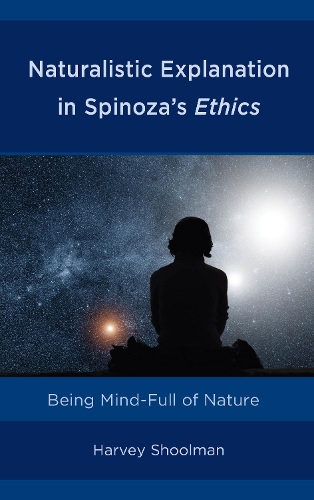
Naturalistic Explanation in Spinoza's Ethics: Being Mind-Full of Nature
(Hardback)
Publishing Details
Naturalistic Explanation in Spinoza's Ethics: Being Mind-Full of Nature
By (Author) Harvey Shoolman
Bloomsbury Publishing PLC
Lexington Books
14th October 2019
United States
Classifications
Professional and Scholarly
Non Fiction
170.92
Physical Properties
Hardback
782
Width 159mm, Height 228mm, Spine 46mm
1220g
Description
Spinoza was the most uncompromising naturalist in the history of philosophy, determined to provide a comprehensive system of ultimate reasons for the existence of any object or event by relating that object or event to the infinitely complex structure of Nature itself. Unprecedented in the detail of its philosophical analysis, Naturalistic Explanation in Spinozas Ethics: Being Mind-Full of Nature examines explanatory naturalism in Spinozas mature metaphysical text, the Ethics. Rooted in intellectual history yet committed to contemporary application, Harvey Shoolmans fresh interpretation of Spinozas theory of mind and action highlights the originality of Spinozas vision, including his account of the existence of consciousness in Nature and the way that conscious awareness relates to the complex physical structures that express cognitive properties. Shoolman provides a clear interpretation of Spinozas doctrine of the Eternity of the Human Mind. He also gives insight into the way Spinoza understood both mathematics and physical science in purely naturalistic terms as examples of embodied rational practice, a view that is completely at odds with modern conceptions of what scientists do. Furthermore, the book interprets social and political phenomena as rational extensions of any naturalistic theory of mind. Shoolman presents us with a more subtle and potent Spinoza, whose naturalistic vision privileges the rational and the deductive over the empirical and the inductive.
Reviews
To take Spinoza seriously is to take Nature seriously: to regard it as a systematically organised whole that constitutes us mentally and bodily. So used are we, though, to place ourselves above or against nature that we almost rebel against a philosophy in which the propositions and scholia, even the ink and paper constituting the Ethics refuse just to be read, and actually begin to entangle themselves with us like so many roots. A great merit of Shoolmans work is to convey this uncommon sense to the reader; to shift the focus from man and his God and ask: what is it to be Nature as Nature Informed by a deep understanding of mathematics and biology, Shoolmans accounts of perception and action are particularly provoking. -- Stephen Connelly, University of Warwick
Author Bio
Harvey Shoolman is lecturer at London Metropolitan University.
